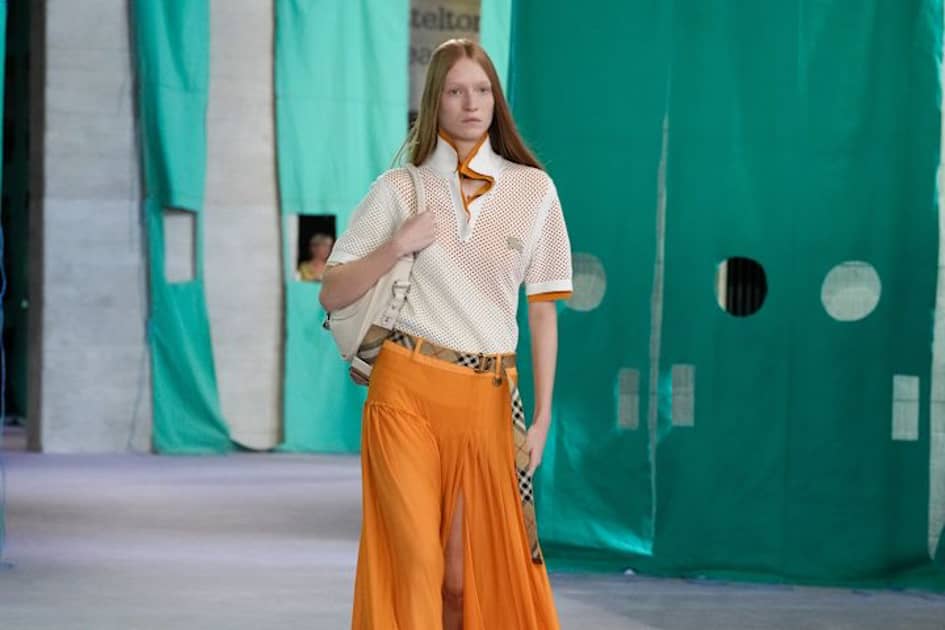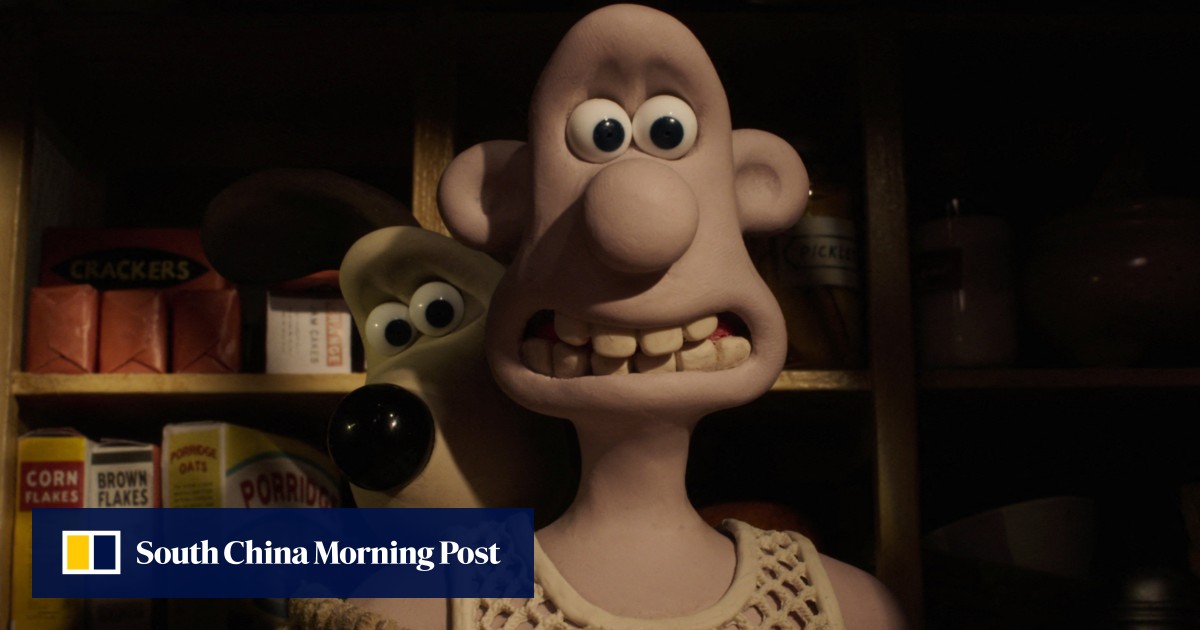As London Fashion Week marks its 40th anniversary, it stands as both a beacon of innovation and a mirror reflecting the industry’s evolution. The event’s legacy, particularly its 1990s zenith, casts a long shadow over today’s proceedings. In that era, the runways sizzled with the avant-garde visions of Alexander McQueen, the punk-infused rebellion of Vivienne Westwood, and the romantic extravagance of John Galliano. It was a time when conceptual daring often trumped commercial considerations, propelling British designers to the helm of international luxury houses. When else would you stand in the rain, in a snaking queue in Vauxhall, waiting for an eternity to be let into a chilly warehouse, only to be dazzled by the showmanship of Mr McQueen?
This golden age of creativity has left an indelible mark, with today’s fashion zeitgeist awash in ’90s revival. Nostalgia aside, Burberry emerges as the quintessential success story, despite its recent financial struggles, as a brand that has navigated the waters of changing tastes and economic turbulence to remain a linchpin of London’s fashion calendar. While countless emerging labels have flickered briefly before fading, Burberry’s enduring presence serves as a testament to the potential for commercial triumph without sacrificing creative integrity.
As the industry grapples with rapid technological change and shifting consumer priorities, London Fashion Week’s anniversary offers a moment to reflect on its rich history while charting a course through an uncertain future. The challenge now lies in recapturing the spirit of its heyday while adapting to the demands of a more socially conscious, digitally driven marketplace.
Brazil: Creating Fashion for Tomorrow
The curtain rose on London Fashion Week with the Brazilian embassy playing host to a vibrant celebration of women’s influence in fashion. “Brazil: Creating Fashion for Tomorrow” (BCFT) which launched its sophomore exhibition, “A Chain of Women”, spotlighting female-led brands and initiatives from South America’s largest economy. The showcase, which featured designers such as PatBo and Farm Rio, not only underscores the creative prowess of Brazilian women in the industry but also addresses broader economic challenges they face. This timely focus on gender equality in fashion set a relevant tone for the week.
H&MxLONDON
The event that really cemented the start of the season’s fashion week was, of course, a boomtastic party, with H&M, who took over the Copper Box Arena and saw a performance by musician of the moment Charli XCX, who is also the face of H&M’s fall campaign. The Swedish fast fashion giant has taken a page out of Tommy Hilfiger’s fashiontainment playbook, and is planning a series of no-expense-spared global events it hopes will drive positive brand sentiment by combining fashion and music and uniting a wide community of creatives in fashion-capital cities around the world. Milan fashion week is also on its list of eight events.
S.S. DALEY
S.S. Daley, fresh from securing the prestigious Queen Elizabeth II Award for British Design, made a triumphant return to London Fashion Week after a brief absence. The label’s founder, Steven Stokey-Daley, chose the halls of the Royal Academy of Arts to unveil his debut womenswear collection. Earlier this year Stokey-Daley confirmed that pop icon Harry Styles has taken a stake in the business, lending both financial heft and cultural cachet to the emerging label. Mr Styles was seated on the front row at the show.
Drawing inspiration from the iconoclastic British painter Hannah Gluckstein, known professionally as Gluck, the collection paid homage to a figure who eschewed gender norms and honorifics long before such concepts entered the mainstream discourse. Gluck’s pioneering masculine aesthetic, which continues to resonate with contemporary designers, served as a springboard for Stokey-Daley’s foray into womenswear.
On the runway, this translated into a seamless integration of the arts and crafts sensibility that has become S.S. Daley’s hallmark in menswear. The result was a collection that not only expanded the brand’s reach but also reinforced its commitment to challenging traditional gender boundaries in fashion.
CHET LO
In a poignant tribute to his mother, Mai-Wah Cheung, Chet Lo’s SS25 collection, “Mai’s Blossoms”, weaves a sartorial narrative of female empowerment and personal transformation. Drawing inspiration from Cheung’s journey from pioneering computer scientist to digital media executive and, ultimately, artist and educator, Lo presents a collection that balances corporate power dressing with artistic fluidity.
The designer’s signature ‘glitch’ pattern takes on new significance, symbolising both digital precision and life’s unpredictabilities, while fruit motifs nod to Cheung’s current artistic pursuits. Through a thoughtful progression of silhouettes, textures, and a colour palette transitioning from authoritative tones to serene hues, Lo crafts a visual metaphor for resilience and reinvention. This deeply personal collection not only showcases Lo’s evolving design acumen but also offers a timely reflection on the intersection of technology, art, and identity in contemporary fashion.
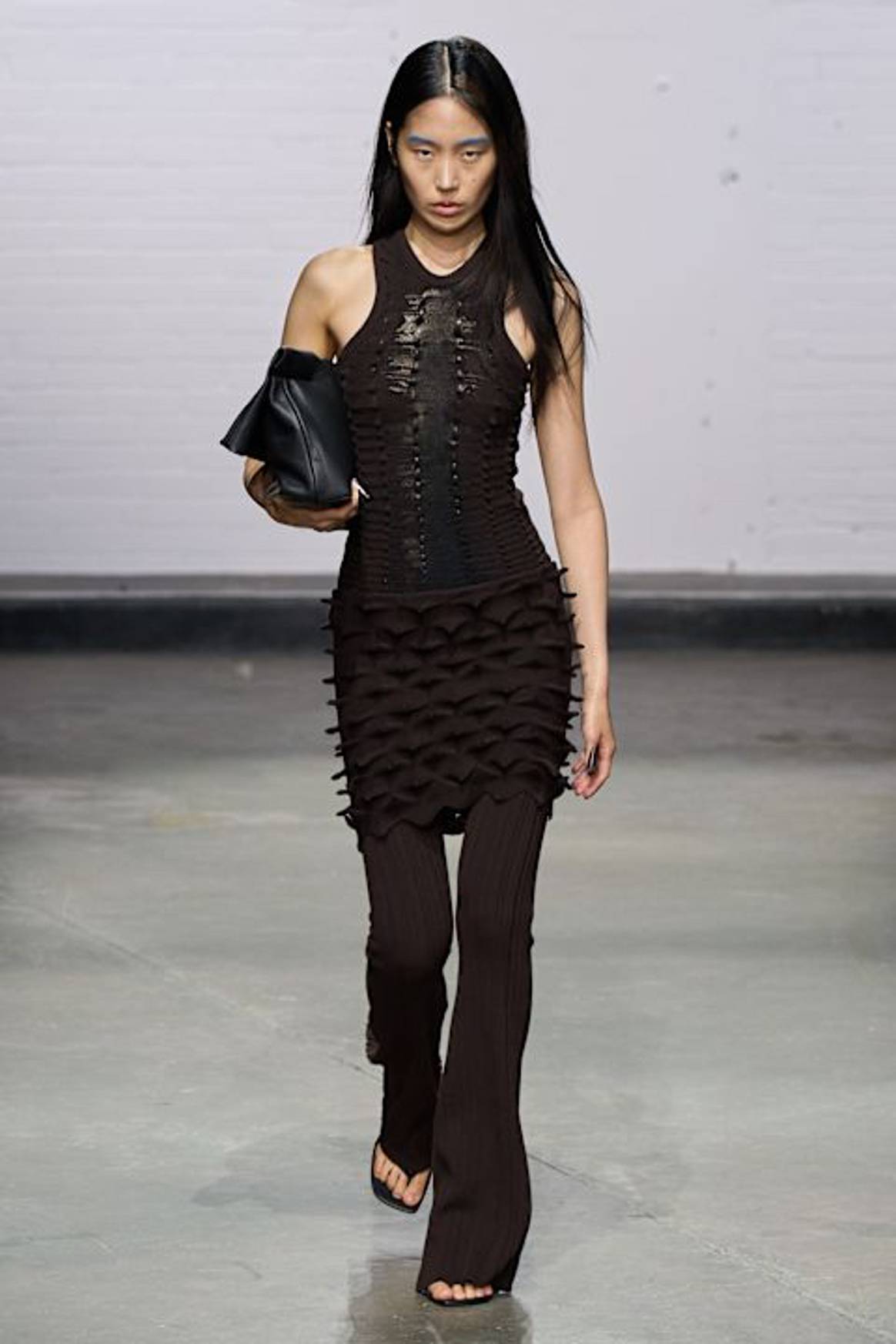
FASHION EAST
LFW’s much-needed incubation programme, Fashion East, was one of the few platforms where menswear was dominant. After the BFC shuttered the LFW Collections: Men format, there remains a need for a visionary men’s fashion week if co-ed presentations fail to gain traction during the traditional women’s calendar.
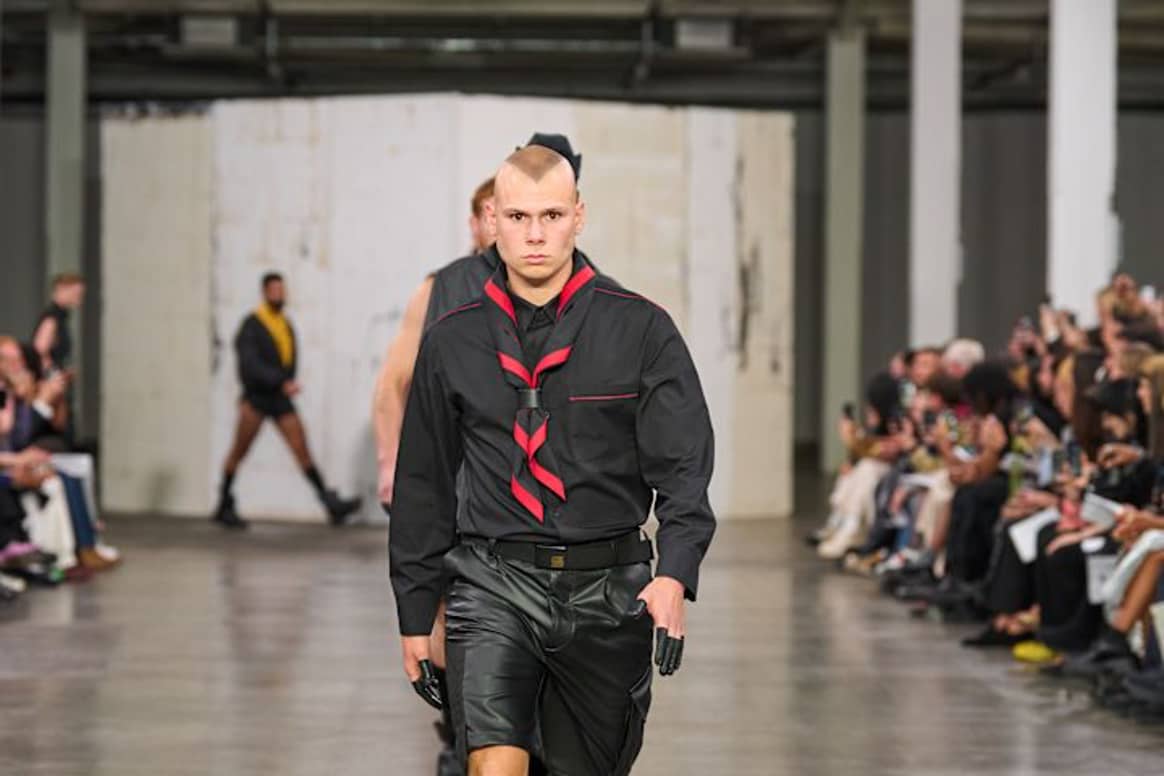
Nearly a quarter of a century since its launch in 2000, Fashion East remains one of the most innovative platforms for showcasing new names and inspiring ways of presenting work across fashion week, retail, and curated standalone events. Winning recipients are awarded a programme of support for up to three seasons, including showcasing at London Fashion Week, financial bursaries, and expert mentoring.
With alumni including Kim Jones, Jonathan Anderson, and Simone Rocha, the platform has earned a fierce reputation for launching the UK’s brightest talent, giving a voice to young fashion creatives, and shaping the conversation.
This season’s designers, showing at the Truman Brewery in East London, included Pia Schiele of the skate brand Loutre, Cameron Williams and Jebi Labembika of Nuba, who presented collections alongside returning designers Olly Shinder, Samara Scott, and Sos Skyn, whose lo-fi couture brand of one-off pieces is both sensual and sculptural.
RAEBURN RETROSPECTIVE
In a landmark retrospective, Christopher Ræburn celebrates 15 years of pioneering sustainable fashion with an exhibition that is both a testament to his brand’s journey and a beacon for the industry’s future. Curated by Harris Elliott at The Lab E20 in Stratford, the showcase offers an intimate look at the designer’s trajectory from radical experimenter to influential innovator.
“It seemed only right and proper that after fifteen years I did a little something to celebrate; this exhibition charts a decade and a half or creativity, community & collaboration and my hope is that it will prove an inspiration for future generations, as well as being an opportunity to thank those that have done so much to build and support our efforts,” Ræburn reflects.
The exhibition chronicles the brand’s evolution but also mirrors the seismic shift in fashion’s approach to sustainability. With many never-before-seen pieces on display, Raeburn 15 Retrospective offers a compelling narrative of a label that has consistently pushed boundaries. Yet, true to form, Ræburn’s gaze remains fixed on the horizon, with the exhibition also spotlighting emerging innovators and hinting at the brand’s next chapter in sustainable design.
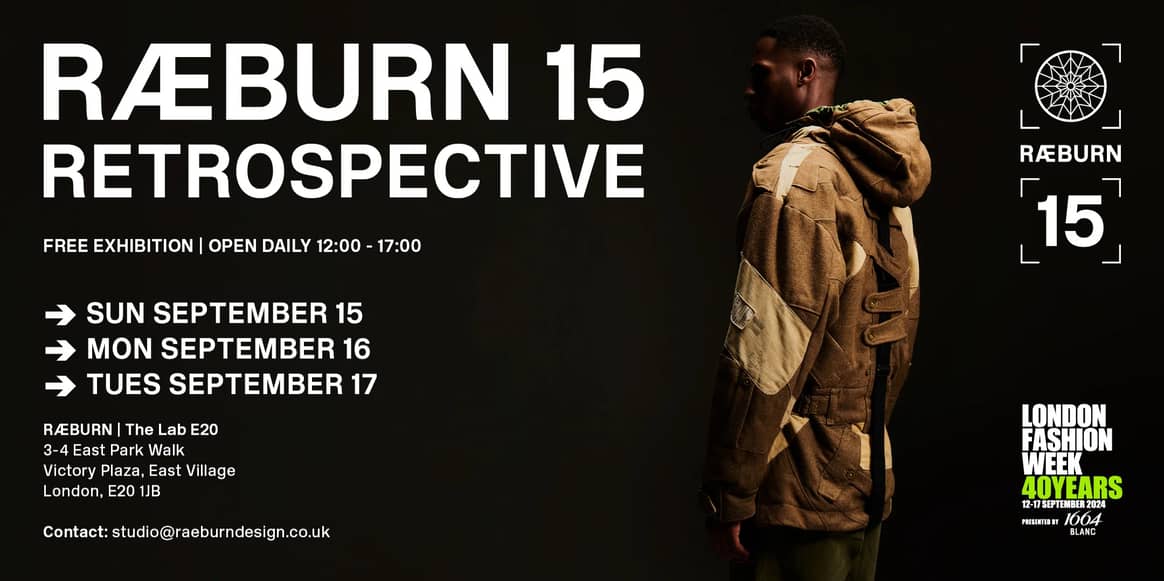
AHLUWALIA
Ahluwalia’s SS2025 collection, “Home Sweet Home,” presented an exploration of heritage and belonging that resonates in today’s global context. Priya Ahluwalia, drawing from her Indian-Nigerian roots and inspired by a transformative trip to Jamaica, crafts a narrative that intertwines personal history with broader themes of migration and identity. The collection’s strength lies in its nuanced approach to textiles and techniques, featuring knotted and pleated fabrics that symbolise the emotional pull of ancestral homes.
Deadstock Chloe fabrics in tailored suits and vintage doilies showcase Ahluwalia’s commitment to sustainability and craftsmanship. A colour palette of earthy tones punctuated by sky blues and blacks evokes both nostalgia and modernity. The show’s immersive soundscape, a collaboration with MassiveMusic and Nigerian artist Adekunle Gold, further enhanced the multi-sensory experience, which was held at Church House.
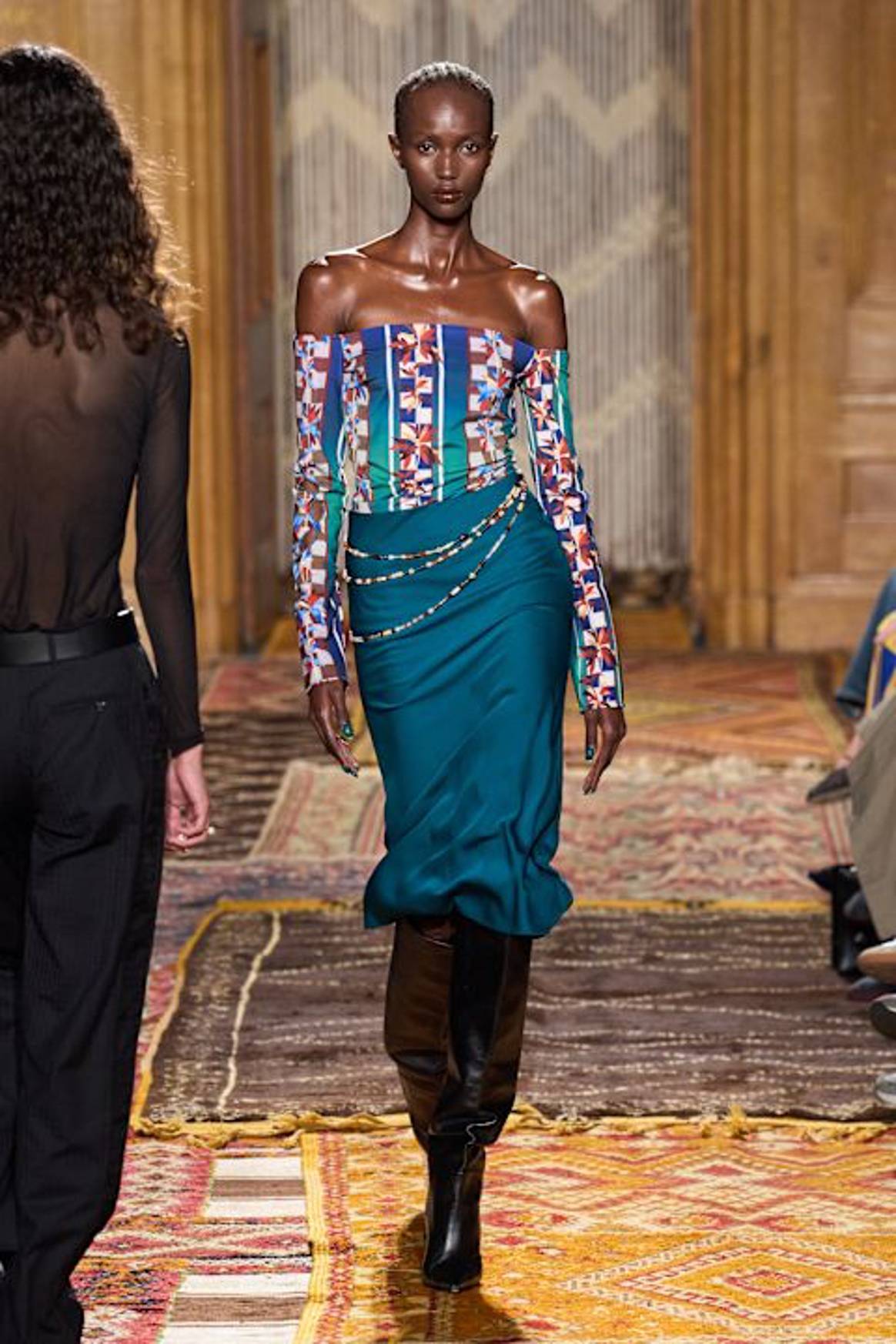
NENSI DOJAKO
Nensi Dojako, an LVMH Prize winner and shortlisted of this year’s BFC/Vogue Designer Fashion Fund, took two season out of the London Fashion Week catwalk calendar. After a period of restructuring, the designer has been busy with a Calvin Klein collaboration, which was revealed during her SS25 presentation. The collab marks a sophisticated evolution in lingerie-inspired ready-to-wear. Sculptural metal hardware serves as a unifying motif throughout the collection, adorning everything from languid slip dresses to oversized tailoring. Dojaka’s meticulous attention to detail breathes new life into 1990s-inspired silhouettes, while Calvin Klein’s engineering ensures support and wearability.
Dojaka articulates her vision, stating, “The collection is an exploration of femininity. But I’ve never wanted to approach femininity the ‘normal’ way. I want to re-paint the image of women, showing both sides: the vulnerability, but also the strength that characterizes them.” Eva Serrano, Global Brand President of Calvin Klein, said in a statement: “Nensi is truly doing something special in womenswear. Her vision and talent are next level, and when I think about the creative partners that have impacted Calvin Klein, Nensi is a part of that history.”
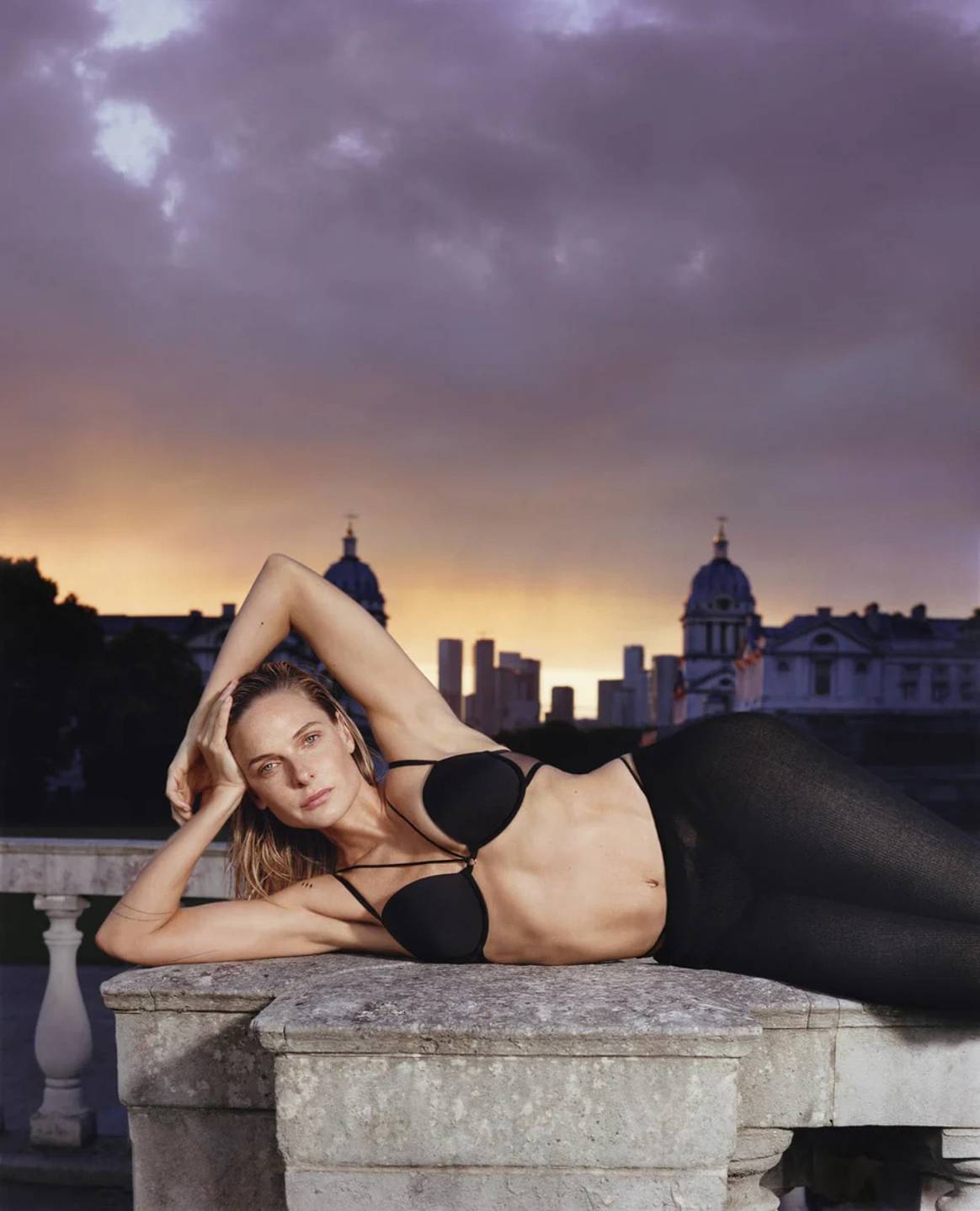
ROKSANDA
In her Spring/Summer 2025 collection, Roksanda Ilinčić deftly interweaves environmental consciousness with sartorial elegance, drawing inspiration from Agnes Denes’ seminal work “Wheatfield – A Confrontation”.
Presented in London’s architectural gem, Space House, the collection strikes a delicate balance between structured tailoring and fluid draping, embodying a modern femininity that resonates with Denes’ critique of misplaced priorities. Ilinčić’s signature voluminous silhouettes are reimagined in recycled mixed-fibre taffeta, while unexpected cut-outs in tailored pieces offer glimpses of skin beneath.
The designer’s Serbian roots are evident in prints inspired by Belgrade’s riverscapes and textiles reminiscent of native harvests, adding a personal touch to the collection’s environmental narrative. A collaboration with FitFlop introduces innovative footwear, seamlessly blending comfort with avant-garde design.
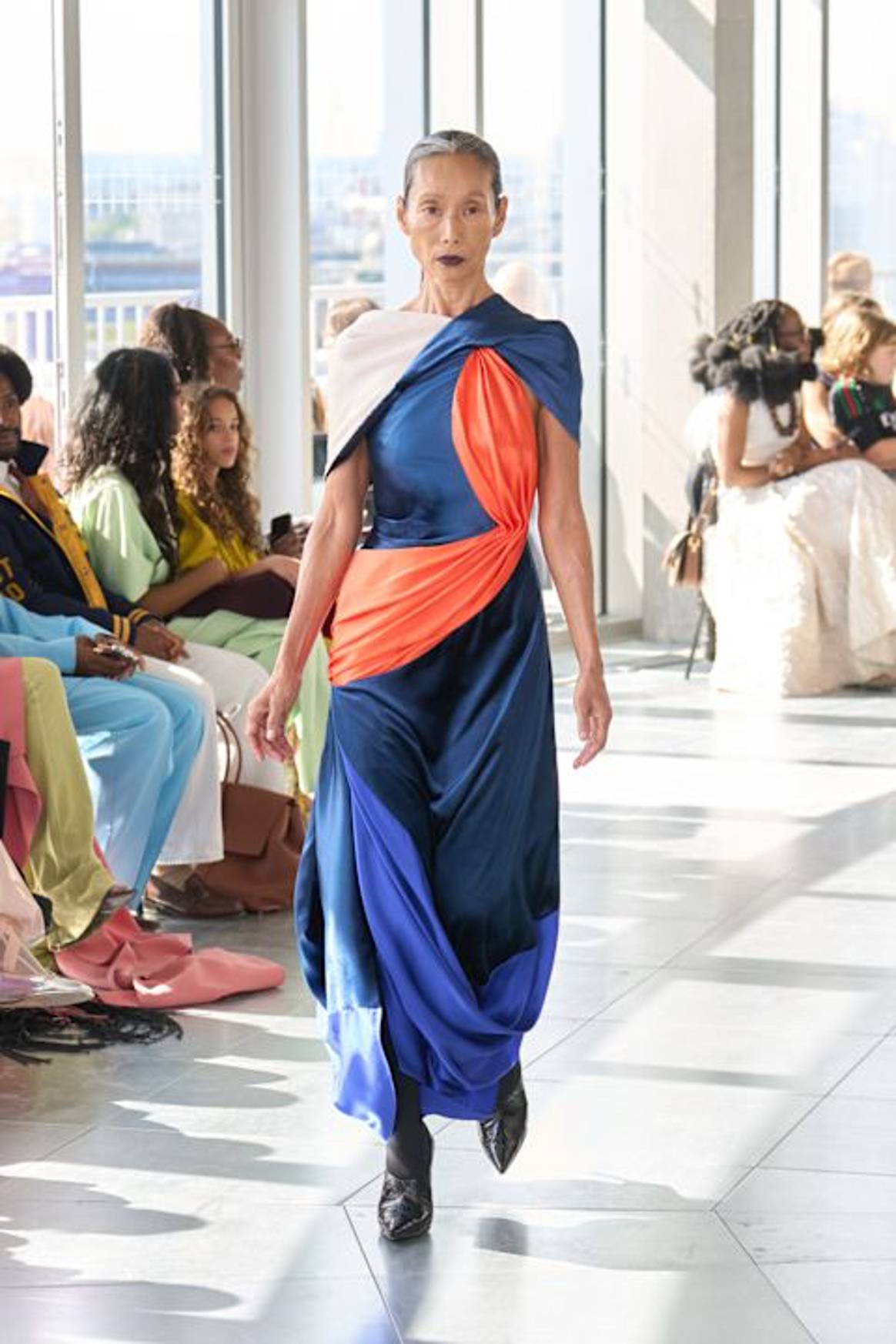
SIMONE ROCHA
Simone Rocha, arguably London Fashion Week’s most subversive romantic designer, charted new territory for SS25, departing from her signature elaborate gowns to present a collection that, by her standards, could be considered pared-back and minimalist. The show, held at the Old Bailey, the UK’s central criminal court, marked a shift towards a more sensual aesthetic, with designs that celebrated both the body’s silhouette and exposed flesh, even when enveloped in volume.
The ballet emerged as a central theme, such as tutu-inspired dresses that paired sheer bodices with unexpected elements like denim jackets, signaling a departure from Rocha’s typically more restrained approach. Floral motifs made their obligatory appearance, this time as delicate appliqués adorning sheer tunics and over-the-knee socks.
A blood-red silk gown with a daring high split demonstrated Rocha’s versatility, proving she can execute glamour as skillfully as her renowned gothic aesthetic. This collection displayed a newfound playfulness, suggesting that Rocha has loosened the constraints of her technical prowess to embrace a fresher, more liberated design ethos.
The juxtaposition of the collection’s lighter tone against the gravitas of the Old Bailey created a compelling narrative, underscoring Rocha’s ability to balance contradiction and harmony. By easing the structural intensity that has defined her previous work, Rocha has opened a window to a new creative direction, inviting in a breath of fresh air.
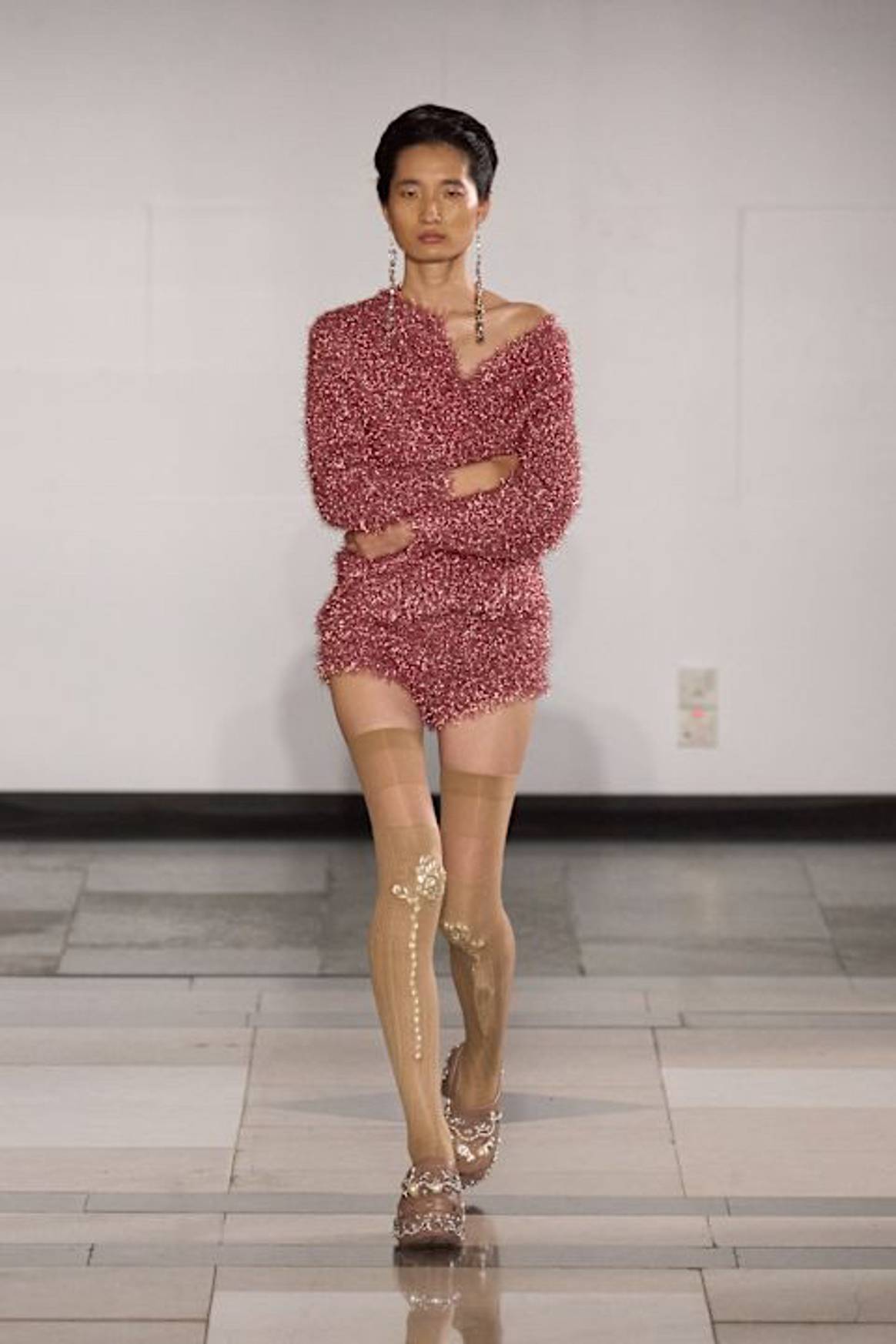
BURBERRY
Burberry’s Spring Summer 2025 show, held at London’s National Theatre, saw its iconic space transformed by the large fabric prints of British artist Gary Hume. The collection, under creative director Daniel Lee, marked his most utilitarian to date, yet carried a notably lighter tone compared to past seasons. Gone were the heavy, blanket-like pieces, replaced with more accessible designs that are likely to resonate with consumers at retail level.
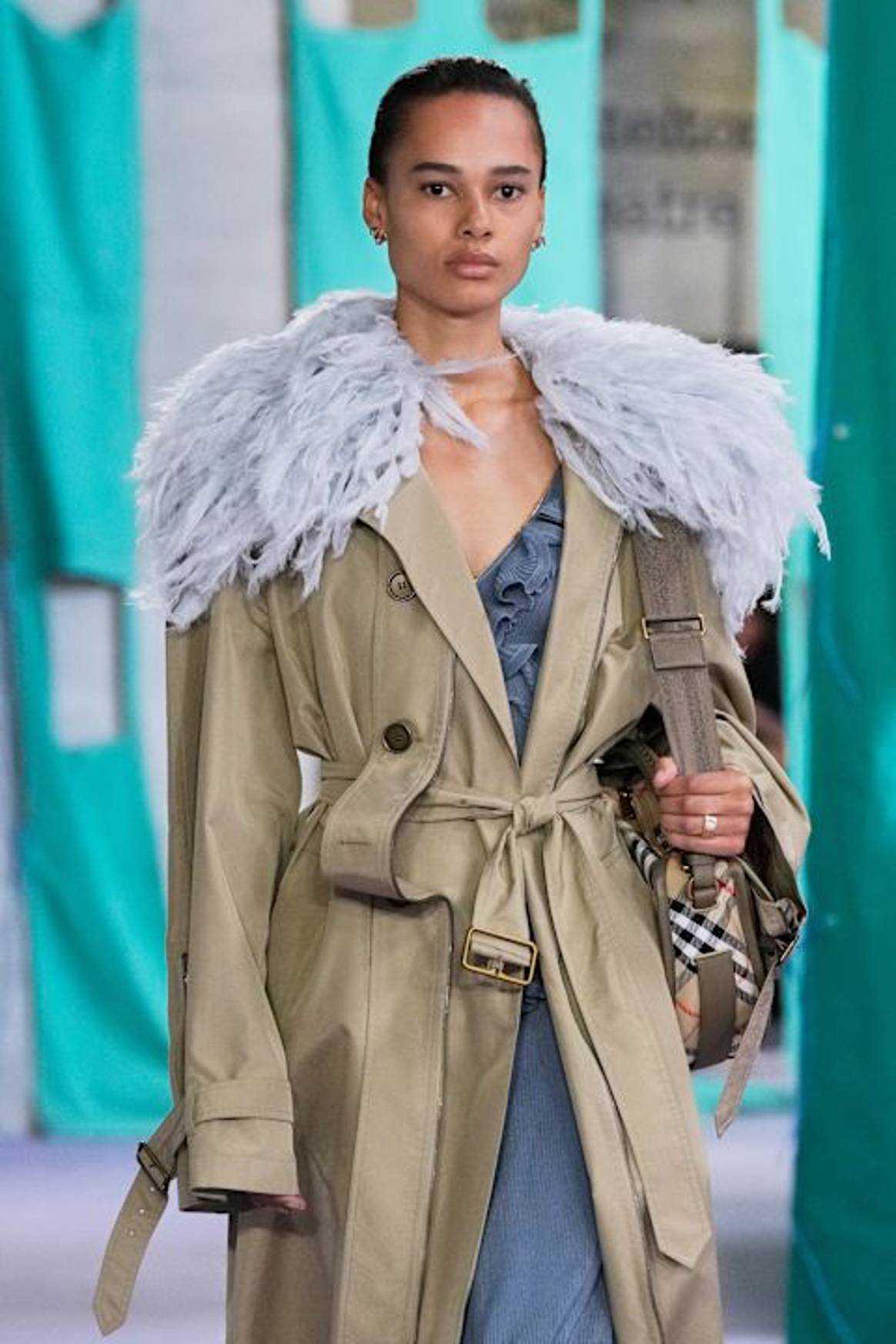
This show also came under the newly restructured leadership of CEO Joshua Shulman, who only took the helm in July. Shulman is the third American executive to partner with a British creative director at Burberry, following the legacy of Rosemarie Bravo and Christopher Bailey, and later Angela Ahrendts. During their tenure, Burberry mastered the art of balancing the attainable with the aspirational—becoming the Ralph Lauren of British fashion, steering clear of the ultra-luxury sphere dominated by Dior and Chanel. It remains to be seen whether the Shulman-Lee partnership will yield the same success, but with Burberry recently delisted and struggling with revenue declines, the stakes are high.
Lee’s collections have thus far garnered tepid reactions from the press, with many still waiting for that moment of innovation and surprise. However, this season did offer subtle updates to the house’s signature styles, such as the variations of the iconic Burberry check and a series of functional zippered details on trousers and military-inspired jackets. The palette was understated, and a new logo crest made an appearance on jacket breast pockets. Notably, a deconstructed dress, seemingly pieced together from a trench or cape using snap buttons, felt airier than previous designs. A few sparkling, strand-style dresses hinted at Burberry’s potential red-carpet presence in the upcoming awards season.
Ultimately, the true test will be how these designs impact Burberry’s financial trajectory, as the brand navigates yet another pivotal moment in its storied history.

